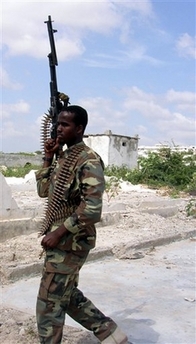Islamic fighters quitting Somalia front
(AP)Updated: 2006-12-26 14:49
MOGADISHU, Somalia - Islamic fighters attempting to wrest power from Somalia's internationally recognized government retreated from the main front line early Tuesday, witnesses said, a day after Ethiopian fighter jets bombed the country's two main international airports.
 An Islamic Courts soldier patrols Mogadishu airport after the Ethiopian air force hit Mogadishu airport, Monday, Dec. 25, 2006. [AP]  |
The Islamic forces also abandoned their main stronghold in Bur Haqaba and were forming convoys headed toward the capital, Mogadishu, residents in villages along the road told The Associated Press by telephone.
"We woke up from our sleep this morning and the town was empty of troops, not a single Islamic fighter," Ibrahim Mohamed Aden, a resident of Bur Haqaba said.
On the northern front, government and Ethiopian troops entered the town of Bulo Barde, where just two weeks ago an Islamic cleric said anyone who did not pray five times a day would be executed.
"We have withdrawn as part of our military strategy," said Sheik Mohamoud Ibrahim Suley, an official with the Islamic council in Mogadishu.
On Monday, Russian-made jets swept low over the capital at midmorning, dropping two bombs on Mogadishu International Airport, part of a major escalation in the week-old fighting. The leader of the Islamic militia, Sheik Hassan Dahir Aweys, flew into the airport shortly after the attack; it was not clear if he was an intended target.
Air strikes also hit Baledogle Airport outside Mogadishu.
"We heard the sound of the jets and then they pounded," said Abdi Mudey, a soldier with the Council of Islamic Courts, which has seized the capital and much of southern Somalia since June.
Somalia has not had an effective government since warlords overthrew longtime dictator Mohamed Siad Barre in 1991, pushing the country into anarchy. Two years ago, the United Nations helped set up a central government for the arid, impoverished nation on the Horn of Africa.
But the government has not been able to extend its influence outside the city of Baidoa, where it is headquartered about 140 miles northeast of Mogadishu. The country was largely under the control of warlords until this past summer, when the Islamic militia movement seized power.
Experts fear the conflict in Somalia could engulf the region. A recent UN report said 10 countries have been supplying arms and equipment to both sides of the conflict, using Somalia as a proxy battlefield. Some analysts also fear that the courts movement hopes to make Somalia a third front, after Afghanistan and Iraq, in militant Islam's war against the West.
The Islamic group's often severe interpretation of Islam is reminiscent, to some, of Afghanistan's Taliban regime ¡ª ousted by a US-led campaign in 2001 for harboring Osama bin Laden. The US government says four al-Qaida leaders, believed to be behind the 1998 bombing of the US Embassies in Kenya and Tanzania, are now leaders in the Islamic militia.
On Ethiopian television Monday night, the defense
ministry said troops would move toward the city of Jowhar, about 55 miles from
Mogadishu. Later, Ethiopia made a push in that direction, capturing the villages
of Bandiradley, Adadow and Galinsor, according Yusuf Ahmed Ali, a businessman in
Adadow.
| 1 | 2 |  |
|
||
|
||
|
|